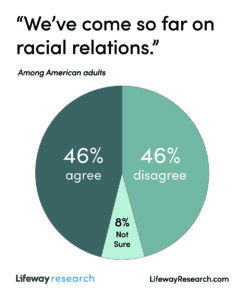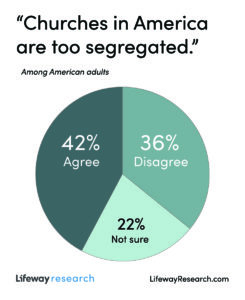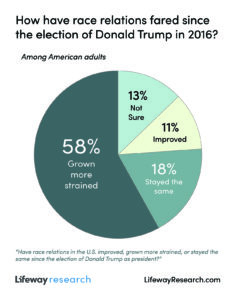NASHVILLE, Tenn.—Fewer Americans believe the nation has made significant progress in race relations, and a majority say things grew worse under Donald Trump’s presidency.
A recent Lifeway Research study, conducted prior to the 2020 election, finds U.S. adults are less likely now than in 2014 to agree with the statement “We have come so far on racial relations.”
 According to the most recent study, 46 percent say Americans have made worthwhile progress in race relations—28 points fewer than in 2014 when 74 percent said the same.
According to the most recent study, 46 percent say Americans have made worthwhile progress in race relations—28 points fewer than in 2014 when 74 percent said the same.
Americans are also twice as likely to disagree than in 2014. Today, 46 percent don’t believe we have come a long way on race relations, while it was 23 percent in 2014.
“With a change in methodology from telephone in 2014 to online, we cannot say definitively if this decreased optimism is an actual change in sentiment or increased forthrightness,” said Scott McConnell executive director of Lifeway Research. “Regardless, optimism on race relations is lower than we previously thought.”
White Americans are the most likely to say we’ve made significant progress (51 percent), while African Americans are the most likely to disagree (66 percent).
Religiously unaffiliated Americans are the religious group least likely to agree with the statement (38 percent). Among Christians, those who attend at least monthly (57 percent) are more likely than those who attend less frequently (39 percent) to believe the nation has come a long way on race relations. Americans with evangelical beliefs are more likely to agree (58 percent) than those without such beliefs (43 percent).
Religious influence
When thinking about how to improve race relations, most Americans (57 percent) say religious leaders play a positive role. Around a quarter (24 percent) disagree, and 18 percent aren’t sure.
Currently, some of the most skeptical of religious leaders’ positive impact on race relations are the religiously unaffiliated, young adults and those without much formal education. Religiously unaffiliated adults are the most likely religious demographic to disagree (38 percent).
Sign up for our weekly edition and get all our headlines in your inbox on Thursdays
Those age 18-34 are the least likely to say religious leaders play a positive role in race relations (50 percent) and most likely to say they aren’t sure (27 percent). Those with a bachelor’s (67 percent) or graduate degree (63 percent) are more likely to agree religious leaders help than those with a high school degree or less (51 percent).
Among Christians, the more often they attend church services, the more likely they are to believe religious leaders play a positive role in race relations.
“Those who are around church the most see religious leaders’ contributions to race relations,” McConnell said. “However, there appears to be a need for both more positive contributions and for such stories to be shared, as more than a quarter of the non-religious and young adults don’t see it.”
 Americans are divided over whether U.S. churches are too segregated. More than 2 in 5 (42 percent) believe that to be true, while 36 percent disagree and 22 percent aren’t sure.
Americans are divided over whether U.S. churches are too segregated. More than 2 in 5 (42 percent) believe that to be true, while 36 percent disagree and 22 percent aren’t sure.
Young adults, those age 18-34, are more likely to view churches as too segregated (46 percent) than those 50 and older (38 percent). Half of African Americans (52 percent) and Hispanics (50 percent) agree, compared to 38 percent of white adults.
Slightly more than a third of Protestants (37 percent) believe churches are too segregated, the lowest among religious groups. The religiously unaffiliated (48 percent), other religions (47 percent) and Catholics (45 percent) are all more likely to say congregations are too racially segregated.
A previous Lifeway Research study found evidence churches are becoming more diverse, though most are still mostly one ethnic group. In 2017, 81 percent of Protestant pastors said their church was predominantly one racial group, down from 86 percent in 2013.
Better or worse?
In the latest Lifeway Research survey, most Americans (58 percent) say race relations in the country grew more strained since the election of Trump as president, while 18 percent say things have stayed the same and 11 percent say relations have improved.
 African Americans (72 percent) are most likely to say race relations grew more strained under President Trump, but majorities of Hispanics (61 percent) and whites (54 percent) also agree.
African Americans (72 percent) are most likely to say race relations grew more strained under President Trump, but majorities of Hispanics (61 percent) and whites (54 percent) also agree.
The latest survey shows 71 percent of Americans agree with the statement: “We’ve got so far to go on racial relations,” while 21 percent disagree. The portion of those who believe we have much farther to go is down from 81 percent in 2014. Among African Americans, however, 81 percent still agree that the U.S. has a long way to go.
For 7 in 10 Americans (69 percent), racial diversity is good for the country. Around a quarter (23 percent) disagree. This is down from 2014 when 82 percent of Americans said they believed our nation’s racial diversity was beneficial. The percentage of white Americans who see diversity as good fell almost 20 points (85 percent in 2014 to 66 percent today).
Among those that identify as Christian, those who attend church less than once a month are the least likely to see racial diversity as good for the U.S. (63 percent).
“This seems to be an area where pastors are influencing those who are in the pews,” said McConnell. “In the 2017 Lifeway Research study, 93 percent of Protestant pastors said every church should strive to achieve racial diversity. Those that attend more frequently are more likely to see diversity as a benefit to our country.”
The online survey of 1,200 Americans was conducted Sept. 9-23, 2020, using a national pre-recruited panel. Analysts used quotas and slight weights to balance gender, age, region, ethnicity, education and religion to reflect the population more accurately. The sample includes an over-sample of Americans with evangelical beliefs providing additional reliability for breakouts of this group.
The completed sample is 1,200 surveys, providing 95 percent confidence tthe sampling error from the panel does not exceed plus or minus 3.2 percent. Margins of error are higher in sub-groups.
















We seek to connect God’s story and God’s people around the world. To learn more about God’s story, click here.
Send comments and feedback to Eric Black, our editor. For comments to be published, please specify “letter to the editor.” Maximum length for publication is 300 words.